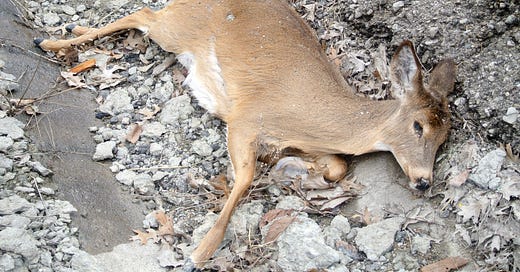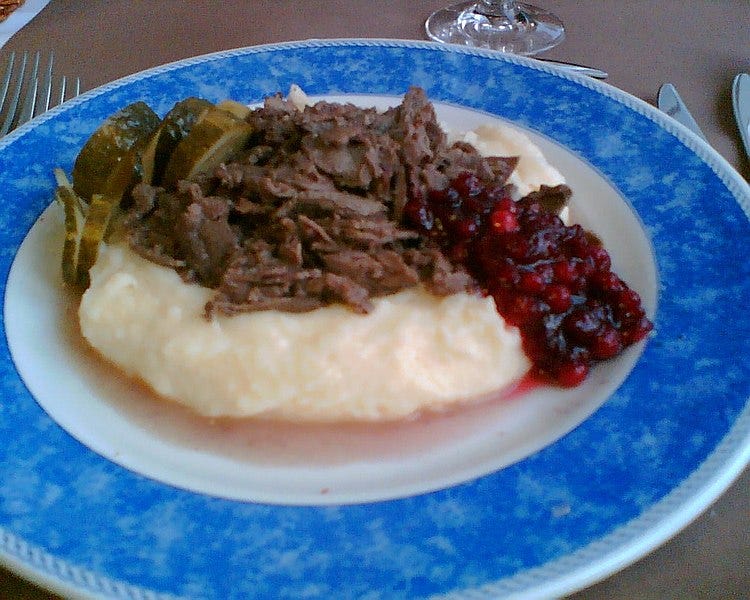Poor Little Critter in the Road
Waste not, want not. Fresh roadkill is seen as an opportunity for free meat by folk who are not squeamish about butchering their own animals. Some road meat gatherers maintain that they are honoring the dead animal by using its meat and fur. Even People for the Ethical Treatment of Animals, a radical vegan non-profit organization, has no moral objections to ‘upcycling’ wild animals killed accidentally. By removing roadkill, you may be saving another life. Other wild animals or family pets may become secondary victims while they attempt to scavenge the roadkill. If you are up to the task or merely ‘roadkill curious’, read on.
Roadkill deer just south of Richmond, Indiana.
Food Safety Risks Roadside
The risks of roadkill are similar to the food safety risks associated with hunted wild game. Even if you hit the animal yourself or see the accident and immediately respond to a ‘fresh’ kill, there are a few additional issues to consider.
When animal is hit by a rapidly moving vehicle, that tremendous force can cause significant internal damage. Contamination of muscle meat by the intestines, bladder and brain tissue is more likely and increases the risk of bacterial infection and transmission of zoonotic diseases. A thorough evaluation of the carcass is necessary to determine its suitability for consumption. Of course, skinning and tanning the hide is a lower risk and might be the only option for a pulverized body.
Here are 8 rules for evaluating roadkill from the website <backdoorsurvival.com>:
Is it legal?
Evaluate the damage
Check the eyes
Check for stiffness and pinch the skin
Evaluate for bugs and blood
What’s the temperature outside?
SMELL
Collection and processing tips
Wide-ranging large carnivores like wolves and grizzly bears and slow-moving animals such as turtles and salamanders are particularly vulnerable to roadkill.
State Regulations on Roadkill
Every state has their own regulations concerning the harvesting of roadkill. Over 20 states allow the collection and consumption of road kill. Vermont, Washington, Oregon and Pennsylvania do. In my home state of Missouri… “an individual who has struck and killed a deer with their vehicle can claim the deer carcass if written authorization to possess the deer is granted by a Missouri Department of Conservation agent.” There is no one site which summarizes the roadkill regulations for all states. Try googling your state name plus roadkill regulations and find a government site to confirm the rules in your area.
Evaluate the Impact Damage
In general, avoid carcasses in the road. They have usually been flattened and crushed more than once. Dead animals on the side of the road are a better bet. How tainted is the muscle meat? If blood and guts are everywhere, avoid this prize.
The Eyes Have It
Similar to assessing the freshness of fish, check out the eyes. Cloudy eyes mean that the animal has been dead for at least a few hours. Pus around the eyes means disease. If the animal has no eyes, best to avoid it.
The Rigors of Rigor
Has rigor mortis (stiffness) set in? Is the skin stuck to the muscle? Can you pull fur out of the skin in tufts? These are indications of carcass age. If the body is still warm and flexible that is a good sign.
Bugs and Blood
Flies, maggots and beetles are a bad sign. Evaluate the amount and color of any visible blood. Fresh blood is dark red. Too much blood could render the carcass inedible.
Ambient Temperature
The hotter the temperature, the faster the decay. Carcasses last longer in winter than summer. Duh! If you decide to collect a carcass, chill ASAP.
SMELL
If it smells bad it is bad.
Collection and Processing
Do not field dress on the side of the road! Make sure that you can safely stop and examine the carcass without endangering yourself in traffic. Wrap your free meat in a tarp or trash bag, load up and process at home. Use the same safety precautions you would employ for cleaning and processing wild game (see SPICY #10 and 11).
October and November are peak times for finding dead deer on the roads. Dawn and dusk are the best times to search for fresh carcasses.
NEXT WEEK: We will conclude our hunting and gathering food safety tips.
Sautéed reindeer with mashed potatoes, lingonberry and gherkin.





